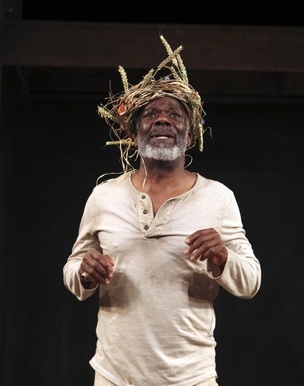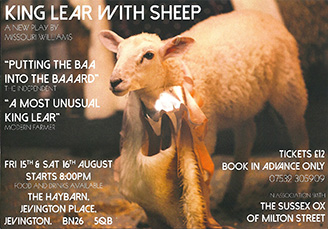
In Dylanland, where I am a regular traveller, there are two kinds of tourists: the Bobcat and the Dylanologist. They can be typified by sustaining the travel analogy: the former are backpackers, while the latter stay in high class hotels. While they are both interested in the same artist, it is for different reasons. The Bobcat is perhaps most exemplified in The Bob Dylan Scrapbook, which purports to be a ‘highly collectable illustrated biography of Dylan's life during the 1950s and 60s’. It is full of reproductions of programmes, even ticket stubs, for the reader to make believe they have collected such material themselves.
I vacillate between these two poles – the high and low of art – in my seeking after King Lear. In the past year two have got away, and it pains me to think of what might have been. The first was playing at the Globe Theatre in London on my return last year from Australia, where I had been researching and writing Three Angry Men, a spiritual memoir of my father who wrote under the name of John Dawes. The production made a return to London via Oxford before heading off to the United States. It has a number of unusual aspects, not the least being a cast of eight is called on to portray all the characters.
The picture of Joseph Marcell as Lear in his pastoral crown is enough to make me want to go back and rearrange my diary. I simply was not aware of it while I was pondering rewrites on the project I was focussing on. It would be tedious to relate the reasons for missing its revival. Suffice to say the diary won again. It did not allow it.
I vacillate between these two poles – the high and low of art – in my seeking after King Lear. In the past year two have got away, and it pains me to think of what might have been. The first was playing at the Globe Theatre in London on my return last year from Australia, where I had been researching and writing Three Angry Men, a spiritual memoir of my father who wrote under the name of John Dawes. The production made a return to London via Oxford before heading off to the United States. It has a number of unusual aspects, not the least being a cast of eight is called on to portray all the characters.
The picture of Joseph Marcell as Lear in his pastoral crown is enough to make me want to go back and rearrange my diary. I simply was not aware of it while I was pondering rewrites on the project I was focussing on. It would be tedious to relate the reasons for missing its revival. Suffice to say the diary won again. It did not allow it.

The second production promised another, dare I say unique, view on the king who loses all in the pursuit of flattering his ego. It was called King Lear With Sheep. I learned of this epic on a walk to Alfriston in Sussex, where I saw a poster for the production in Jevington Barn in the wonderful Much Ado Books.
The concept alone is compelling enough: one actor playing a director seeking to control an unruly cast of sheep. It has had two outings, one in Lewisham in London, and the other in Sussex for two nights in August. Lucie Elven also provided insights into the process..
I learned of both productions after I had missed them. That may be a personal sadness but both, I am sure, would have given me some insight into the seemingly inexhaustible depths of King Lear. The sheep would probably have made me laugh. My mother, Norma Scully, was a grazier. The family property, Enmore, is full of evocative memories for the Scullys and Munros for a range of reasons.
I am sorry to have missed these two performances. Perhaps I dwell in two parts of Dylanland and Learplace. I am already hankering for a production in a woolshed near Beanbri, with a cast of Australian Merinos. I wonder if their accents are up to Shakespeare?
The concept alone is compelling enough: one actor playing a director seeking to control an unruly cast of sheep. It has had two outings, one in Lewisham in London, and the other in Sussex for two nights in August. Lucie Elven also provided insights into the process..
I learned of both productions after I had missed them. That may be a personal sadness but both, I am sure, would have given me some insight into the seemingly inexhaustible depths of King Lear. The sheep would probably have made me laugh. My mother, Norma Scully, was a grazier. The family property, Enmore, is full of evocative memories for the Scullys and Munros for a range of reasons.
I am sorry to have missed these two performances. Perhaps I dwell in two parts of Dylanland and Learplace. I am already hankering for a production in a woolshed near Beanbri, with a cast of Australian Merinos. I wonder if their accents are up to Shakespeare?
 RSS Feed
RSS Feed
